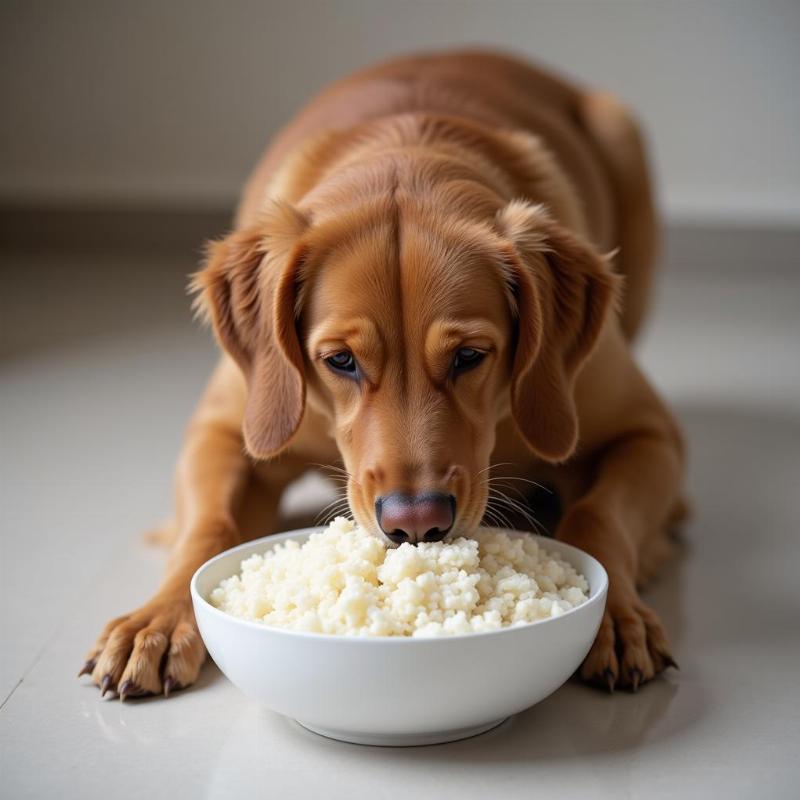Choosing the right food for your furry friend can feel overwhelming. Brown rice and white rice are common ingredients in dog food, but which is the healthier choice? This article dives deep into the brown rice vs. white rice debate for dogs, providing you with the information you need to make the best decision for your canine companion. We’ll explore nutritional differences, potential benefits and drawbacks, and offer practical advice for incorporating rice into your dog’s diet.
Nutritional Showdown: Brown Rice vs. White Rice
Brown rice is a whole grain, meaning it contains the bran, germ, and endosperm. This gives it a nutritional edge over white rice, which has had the bran and germ removed during processing. This processing strips away much of the fiber, vitamins, and minerals.
While both types of rice are primarily carbohydrates, brown rice offers more fiber, which aids in digestion and can help regulate blood sugar levels. It’s also richer in B vitamins, magnesium, and selenium, which support overall health and well-being. White rice, however, is easier to digest due to the removal of fiber.
Is Brown Rice Always the Best Choice?
While brown rice generally offers more nutritional benefits, there are some situations where white rice might be preferable. Dogs with sensitive stomachs or digestive issues may find white rice easier to digest than brown rice. In cases of diarrhea, white rice is often recommended as part of a bland diet to help firm up stool.
 Dog with Sensitive Stomach Eating White Rice
Dog with Sensitive Stomach Eating White Rice
Incorporating Rice into Your Dog’s Diet
Rice should be served cooked, never raw. Whether you choose brown or white rice, make sure it’s plain and without any seasonings or additives. You can mix a small amount of cooked rice with your dog’s regular food. Remember, rice should only be a supplemental part of a balanced diet, not the main component. Always consult your veterinarian before making significant changes to your dog’s diet, especially if your dog has any underlying health conditions.
Brown Rice for Dogs: Benefits and Considerations
Brown rice can be a healthy addition to your dog’s diet, offering valuable nutrients like fiber, B vitamins, and minerals. The fiber in brown rice can help with digestion and regulate blood sugar. However, some dogs might find brown rice harder to digest.
Is Brown Rice Good for Dogs with Allergies?
Brown rice is often included in hypoallergenic dog food formulas because it’s less likely to trigger allergies than other grains like wheat or corn.
White Rice for Dogs: Benefits and Considerations
White rice is easily digestible, making it a good option for dogs with sensitive stomachs or digestive upset. It can be beneficial during bouts of diarrhea. However, white rice lacks the nutritional punch of brown rice and should be given in moderation.
Can I Feed My Dog White Rice Every Day?
While a small amount of white rice isn’t harmful, feeding it daily isn’t recommended. White rice lacks the complete nutritional profile dogs need to thrive.
Conclusion: Choosing the Right Rice for Your Dog
Both brown rice and white rice can be part of a healthy canine diet, but the best choice depends on your individual dog’s needs and health. Brown rice offers more overall nutritional value, while white rice is easier to digest. Always consult with your veterinarian to determine the best option for your furry friend. brown vs white rice for dogs
FAQ
- Can puppies eat rice? Yes, puppies can eat small amounts of cooked rice, but always consult your veterinarian.
- Is too much rice bad for dogs? Yes, excessive rice consumption can lead to weight gain and nutritional imbalances.
- Can rice help with dog diarrhea? White rice is often recommended for dogs with diarrhea due to its easy digestibility.
- What type of rice is best for dogs with diabetes? Brown rice is generally preferred due to its lower glycemic index.
- Can I feed my dog flavored rice? No, avoid feeding your dog flavored rice as it may contain seasonings and additives that are harmful to dogs. white rice vs brown rice for dogs
- Can rice be a complete meal for dogs? No, rice should be a supplement, not a replacement for complete and balanced dog food. chicken and brown rice dog food
- What if my dog is allergic to rice? Consult your vet, who can recommend alternative grains or a grain-free diet. wholesomes chicken and rice dog food
Beautdogs.us is your trusted source for all things dog-related in the USA. We offer expert advice on dog breeds, care, and nutrition, along with product recommendations specifically tailored to the American dog owner. Whether you’re a seasoned pet parent or just starting your journey, Beautdogs.us has the information you need to provide the best possible care for your canine companion. Contact us at [email protected] or call us at +1 501-555-7529. We are here to help!